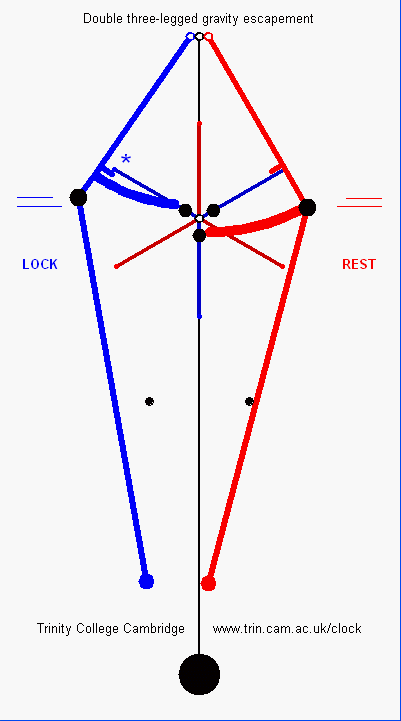
- 06 Jun 2016 [14:00]
- I have been thinking of sticking of the zinc-steep compensation in the pendulum tube. There are several reasons for NOT thinking it is a sticking zinc tube. 1. It is not sudden - it happened over 8 hours from 10am to 6pm <[link]> The clock normally responds very quickly to even the tiniest of mechanical step changes, eg <[link]> which was an adjustment on 1 May. 2. If the zinc is sticking then we would expect under-compensation, ie slower going as temperature rises. It seems to be faster, so it is the wrong way round. 3. It is a small effect, perhaps 200ms/day fast at the moment. Given that an uncompensated pendulum would be -600ms/day/C then if it were sticking we would expect something bigger 4. stress = E * alpha * dT and for zinc E=100GPa and alpha=30e-6/C , say. Then for a 1C temp rise stress = 3MPa, and with a cross section are of about 1000mm^2 then that is an axial force of 3000N, or 300kg. I do not think there is enough friction to sustain this. When we removed the zinc tube a while back it came out relatively easily. 5. There is a small cyclic stress pulse every 1.5 seconds due to centrifugal force. It s about 2N for a 100kg pendulum bob. This ought to be helping to dislodge sticking. But what can it be???? One clue, perhaps, is that the change occurred during a maximum of "rate of change" of temperature. But why?
- 06 Jun 2016 [14:00]
- To give you an idea of what is "normal" then here is data since November. [link] Note that the red and blue arrows indicate intentional adjustments, but that the recent glitch is really one of many, perhaps the most dramatic in recent months. You can change the date back a few years if you want. Also you can look at air pressure, humidity, swing amplitude, etc. Simon mentioned spiders - search for that in comments too. The spider incident was, I think, when a web was spun in the pendulum chamber. the pendulum amplitude reduced which speeds the clock up. But this time the amplitude has not changed, so it is not spiders again - I think.
- 06 Jun 2016 [14:00]
- Things like pigeons standing on the hands, wind, snow etc do not have an effect - that is the beauty of the gravity escapement. Likewise lubrication of gears etc. The effect of opening doors - do a search for "the bedmaker effect" - is understood too, after a fashion. The clock dial faces south and it is definitely possible that sunshine has an effect, but not as one would expect. I have a student (from St Johns) this year exploring the effect of warming of the south-facing wall, thermal expansion and therefore tower tilting. The pendulum develops a noticable twist from time to time and this I think is due to tower tilt. It would be good to see if tower tilt, pendulum twist and changes in going are correlated
- 06 Jun 2016 [14:00]
- so what has caused this dramatic change in going? [link] Temperature compensation is good. Pressure also (air density affects buoyancy). Humidity is a small effect, humidity in this unheated room is fairly constant. There are step changes, like on 6 June. Still stron is the theory that sunshine on south-facing wall causes thermal expansion and tower tilt. I have a final-year project student (from St Johns !) to measure this effect, strarting October.
Download data





